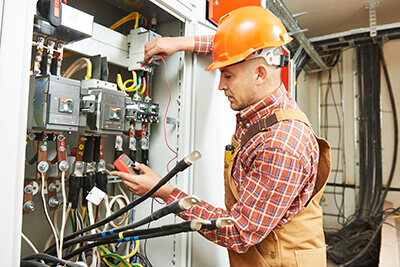 The Electrical Industry is a highly complex, ever-changing world. In order to perform effectively within it, the journeyman electrician must be a skilled mechanical and technical artisan. Anyone wishing to enter this trade must have the aptitude to learn–and be able to develop through training–the knowledge, skills, and ability necessary to perform the tasks associated with it.
The Electrical Industry is a highly complex, ever-changing world. In order to perform effectively within it, the journeyman electrician must be a skilled mechanical and technical artisan. Anyone wishing to enter this trade must have the aptitude to learn–and be able to develop through training–the knowledge, skills, and ability necessary to perform the tasks associated with it.
The Joint Apprenticeship and Training Committee is a partnership of labor and management organized to train those wishing to undertake such a challenge. The training consists of a two-part program of work and school. During the day the apprentice will earn pay while working on a construction project and will attend school at night; learning not only electrical theory but also valuable hands-on laboratory experience.
Both the Construction Inside Wireman Electrician and Maintenance Technician apprenticeship are NYS registered programs that ultimately trains an individual to become a seasoned, skilled electrician. In order to finish the Construction Inside Wireman Electrician program, the apprentice must accrue at least 8,200 hours of on-the-job-training (OJT) and at least 900 hours of classroom related instruction. In order to finish the Maintenance Technician program, the apprentice must accrue at least 10,000 hours of on-the-job-training (OJT) and at least 900 hours of classroom related instruction.
The schooling consists of the following:
A. Safety:
Safety and Health Awareness courses, which include OSHA 10/30-hour course, electrical safety, asbestos safety, hazard communications, first-aid, ladder safety, job safety and work zone safety courses.
B. Blueprints:
Blue print reading and Sketching
AutoCad LT 98
C. Mathematics:
Algebra, Geometry, Trigonometry, and Trade Math
D. Electrical Theory:
Electrical theory consists of Ohms Law, AC theory, DC theory, Series and Parallel circuits, Semi-conductors, Transistors, Diodes, Three-Phase systems, Over-current protection etc..
E. Electrical Trade Science:
Basic Tools and Equipment, National Electrical Code, State and Local Codes, Conduit Fabrication, Transformers, Electrical Grounding, Electronics, Motors, Digital Electronics, Motor Control, Fire Alarms, Programmable Controllers, High Voltage Splicing, Air-Conditioning systems Service and Troubleshooting,
and Customer-Relations.
F. Industrial and Labor Relations:
History of the IBEW and NECA, Labor History background, and Current Laws and Practices.